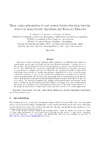Identificador persistente para citar o vincular este elemento:
https://accedacris.ulpgc.es/jspui/handle/10553/16196
| Título: | Shape design optimization of road acoustic barriers featuring top-edge devices by using genetic algorithms and boundary elements | Autores/as: | Toledo Quintana, Rayco Francisco Aznárez González, Juan José Greiner, David Maeso, Orlando |
Clasificación UNESCO: | 120601 Construcción de algoritmos 330506 Ingeniería civil 120505 Geometría de los números |
Palabras clave: | Noise barriers Very thin bodies Shape optimization Genetic Algorithms Dual Boundary Element Formulation |
Fecha de publicación: | 2016 | Editor/a: | 0955-7997 | Proyectos: | Avances en El Desarrollo de Modelos Numéricos Para la Caracterización Dinámica de Cimentaciones Para Aerogeneradores | Publicación seriada: | Engineering Analysis with Boundary Elements | Resumen: | This paper presents a Boundary Elements (BE) approach for the efficiency improvement of road acoustic barriers, more specifically, for the shape design optimization of top-edge devices in the search for the best designs in terms of screening performance, usually represented by the insertion loss (IL). With this aim, a procedure coupling BE with Evolutionary Algorithm is proposed in pursuing barrier configurations with ever higher IL. The complexity normally associated with such designs raises the need to consider some geometric simplifications in order to ease the shape optimization processes. In this way, the overall barrier configuration is modeled as both thickness and null-thickness bodies (the boundary thickness is neglected), as representatives of very thin elements. Such an idealization requires a Dual Boundary Element formulation that allows the problem to be solved. The procedure is applied to 2 D problems and numerical results are presented on the basis of simulations on noise barriers with three different top designs. It is a quite simple process that makes use of well-known both formulations and procedures. The improvements observed in the designs obtained invite to further studies in the same line on devices with similar applications. | URI: | https://accedacris.ulpgc.es/handle/10553/16196 | ISSN: | 0955-7997 | DOI: | 10.1016/j.enganabound.2015.10.011 | Fuente: | Engineering Analysis with Boundary Elements[ISSN 0955-7997],v. 63, p. 49-60 | Derechos: | by-nc-nd |
| Colección: | Artículos |
Citas SCOPUSTM
22
actualizado el 08-jun-2025
Citas de WEB OF SCIENCETM
Citations
19
actualizado el 01-feb-2026
Visitas
106
actualizado el 09-nov-2024
Descargas
193
actualizado el 09-nov-2024
Google ScholarTM
Verifica
Altmetric
Comparte
Exporta metadatos
Los elementos en ULPGC accedaCRIS están protegidos por derechos de autor con todos los derechos reservados, a menos que se indique lo contrario.
